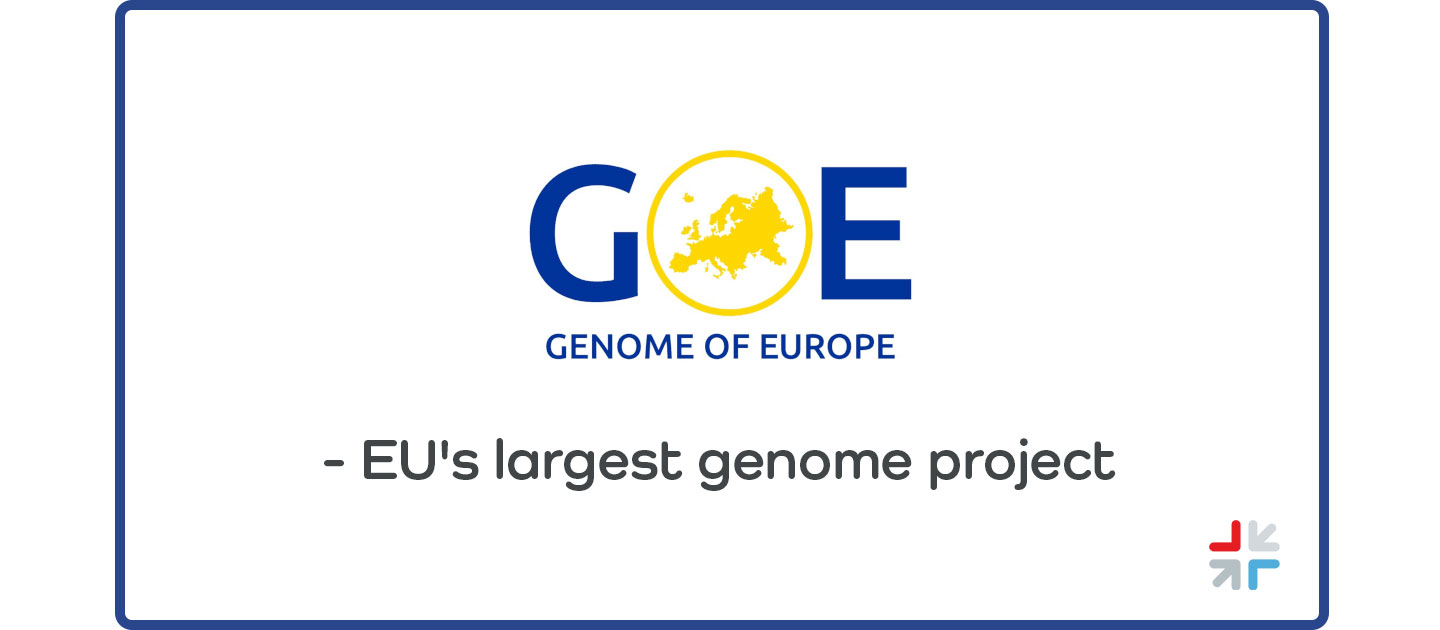
Genome of Europe – EU’s largest genome project
Genome of Europe (GoE) is an ambitious project aimed at establishing the largest pan-European collection of genomic databases to date, bringing together genomic data from more than 100 000 individuals across Europe. The project is a crucial stepping stone towards realising the vision of the 1+ Million Genomes Initiative (1+MG), and is supported by European Commission under the Digital Europe Programme. At its launch in October 2024, the GoE project consortium included 49 partner institutes from across 27 European countries. The number of partners and participating countries is expected to grow over the project’s 42-month span (2024-2028).
Complementing other European projects linked to the 1+ Million Genome Initiative
GoE is an integral step in the series of projects implementing the EU’s 1+ MG Initiative. This coordinated European effort seeks to leverage large-scale genomic data of European citizens to help bring the benefits of genomic medicine to the broader society. GoE was made possible through earlier projects such as B1MG (2020-2023) as well as GDI (2022 – 2026). The B1MG project established the blueprint for the governance, operational procedures, and standards for the genomic data. Among the objectives of the ongoing GDI project, on the other hand, is to deploy the European technical infrastructure to support the handling of genomic data within the 1+MG ecosystem. The GoE project (2024 – 2028) builds upon and complements these efforts by contributing the final critical piece of the puzzle: bringing the genomic data of European citizens into the 1+MG ecosystem.
Role of LNDS within the Genome of Europe
In the GoE consortium, LNDS co-leads a work package dedicated to the Ethical, Legal, and Societal Issues (ELSI) of the project. The aim of the work package is three-fold. First, it supports the consortium partners in addressing the key ethical and legal compliance obligations when obtaining genomic data from patients and research participants. Second, the work package lays down the groundwork for enabling the lawful inclusion, retention, and secondary use of these genomic data collections in the 1+MG ecosystem. Third, it seeks to investigate overarching societal and ethical issues relating to the project, and articulate long-term recommendations to inform the governance of 1+MG data collections in the years ahead.
The work package which LNDS is co-leading, focuses on addressing the ELSI challenges related to the collection, governance, and lawful reuse of genomic and related data.
Davit Chokoshvili, Senior ELSI Specialist at LNDS and Co-Lead of WP3 (ELSI) within the Genome of Europe
Collaboration within Ethical, Legal, and Societal Issues (ELSI)
The ELSI work package (WP3) contains activities also beyond the mandate of LNDS. Representatives from five organisations across five nations, work together in addressing the ELSI challenges of the GoE.
The following GoE project partners are involved in the ELSI work package:
- Luxembourg National Data Service (Luxembourg), work package co-lead
- Biomedical Research Foundation Academy of Athens (Greece), work package co-lead
- University of the Basque Country (Spain)
- Legal Pathways (the Netherlands)
- Sciensano (Belgium)
Contributions of Luxembourg to the GoE
While LNDS contributes to defining ELSI conditions for generating the reference genome, ensuring data security, and embedding GoE data within the Digital Europe Programme-funded Genomic Data Infrastructure (GDI), Luxembourg also has a broader input into this pan-european project. The Luxembourg Institute of Health (LIH) will contribute to the sequencing effort, bringing in Luxembourgish cohorts.
Key goals of the GoE initiative include
- Creating a Pan-European Community of Practice: Establishing a collaborative community to support the reference genome project.
- Evaluate the long-term potential of genome sequencing in research and health care in Europe and beyond, including different sequencing technologies, such as long read sequencing, helping to uncover previously inaccessible “dark regions” of the genome.
- Ethics, Data Security, and Legal Compliance: The project will be guided by ethical, legal, and societal considerations while upholding stringent data security standards, building (inter)national guidelines for the responsible use of WGS that leads to better healthcare for EU citizens.
- Embedding GoE Data within Europe’s Genomic Data Infrastructure: Integrating GoE data into the previously funded Digital Europe Programme’s Genomic Data Infrastructure (GDI) project, ensuring interoperability across initiatives.
- Assessing GoE’s Impact and Usability: Through case studies, evaluating the project’s contributions to understanding genetic diversity, enabling multi-ancestry imputation, and enhancing genetic risk profiling.
GoE Project details in a nutshell
| Name | Genome of Europe (GoE) |
|---|---|
| Duration | 42 months. October 2024 – March 2028 |
| Budget | 20 MEUR (European Commission, under the Digital Europe Programme), 25 MEUR (Member States). (45 MEUR total) |
| Scope | Cross-border, involving various organisations across 27 European countries |
| Related projects | B1MG, GDI, Can.Heal |
Find out more about the project:
The article is written by Davit Chokoshvili, Senior ELSI Specialist at LNDS and Co-Lead of WP3 (ELSI) within the Genome of Europe.


